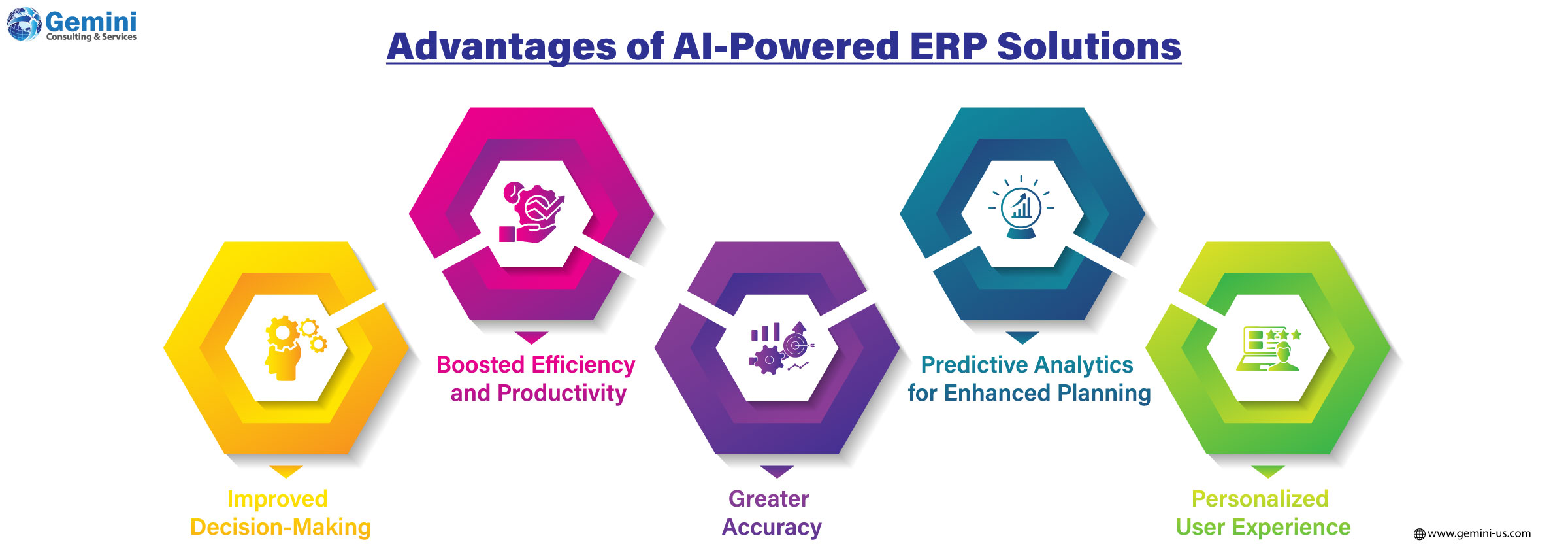The business landscape of Enterprise Resource Planning (ERP) system is undergoing a significant change, largely fueled by rapid advancements in Artificial Intelligence (AI). As companies seek greater efficiency, adaptability, and a competitive edge, the incorporation of AI into ERP frameworks is becoming essential rather than optional. This blog analyses the benefits and potential challenges of AI-enabled ERP solutions.

Integrating AI into ERP Systems
AI technologies, including machine learning, natural language processing, and predictive analytics, present a wealth of opportunities to improve ERP systems. Enterprises can look at automating regular tasks and utilize the valuable time of resources for critical processes by integrating AI. This will help enhance operational efficiency. AI has brought in unprecedented advantages to enterprises as it helps them utilize resources more efficiently, forecast trends and offer personalized experiences to customers.

Improved Decision-Making: AI algorithms can analyze large volumes of data, providing actionable insights and forecasts that enable businesses to make timely, informed decisions.
Boosted Efficiency and Productivity: Automating repetitive tasks allows employees to focus on more strategic activities, thereby increasing overall productivity and operational efficiency.
Greater Accuracy: AI minimizes human error in data entry and analysis, resulting in more reliable financial reporting, better inventory management, and enhanced customer service.
Predictive Analytics for Enhanced Planning: AI can detect patterns and forecast future trends, aiding businesses in inventory control, demand forecasting, and strategic planning.
Personalized User Experience: AI can adapt the ERP interface and features to suit individual user preferences and roles, enhancing usability and overall satisfaction.
Disadvantages of AI-Powered ERP Solutions
Implementation Difficulties: Integrating AI into existing ERP systems can be a complex, lengthy, and expensive process, particularly for Small and Medium-Sized Enterprises (SMEs).
Data Handling Risks: With enterprises dealing with large amounts of sensitive data, it can lead to security threats and thereby increase business risks.
Potential Job Losses: The automation of tasks may result in job displacement, especially for positions focused on routine data entry and analysis.
AI-Dependence: If enterprises invest in AI-driven systems, it can affect the critical thinking and decision-making abilities of employees.
Algorithmic Bias: If not managed carefully, AI algorithms may adopt biases from their training data, resulting in flawed decision-making.
Impact on ERP Users
The integration of AI into ERP systems will have a profound effect on users, from operational teams to senior management. On the positive side, users can expect more streamlined processes, improved decision support, and a more user-friendly ERP experience. AI-driven analytics will offer valuable insights, empowering users to manage business processes proactively.
However, adapting to these new AI functionalities will require users to navigate a learning curve. With increase in automation, enterprises need to invest in reskilling and upskilling their workforce so that they can be shifted from completing routine tasks to more strategic and analytical roles. Additionally, with AI taking over various processes, users must remain attentive to data quality and the integrity of AI-generated decisions, underscoring the importance of continuous oversight and human judgment.
Navigating the Future
Looking ahead, it is evident that AI will be crucial in shaping the future of ERP solutions. To fully leverage AI-driven ERP systems, businesses need a reliable partner. Gemini Consulting & Services can facilitate the implementation of ethical AI practices, invest in employee training, and implement strong data security measures. Contact us to know how our AI experts can help your enterprise. Remember, the success of this integration will hinge not only on the technology itself but also on how effectively businesses adapt to these changes and utilize them for growth and innovation.
In summary, the future of ERP solutions, intertwined with AI advancements, presents exciting opportunities for enhanced efficiency, intelligence, and competitiveness. However, enterprises will also face challenges that require sophisticated skills to resolve. By strategically embracing AI, ERP users can anticipate a future where technology enhances their capabilities, fundamentally transforming how businesses operate and compete in the digital landscape.



